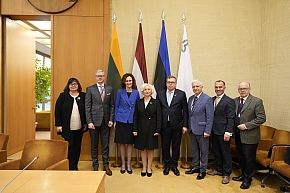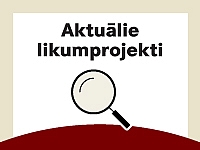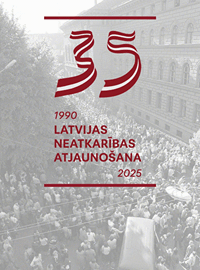 Galerija
Galerija
On Friday, 18 October, parliamentarians of the Baltic States gathered in Vilnius, the capital of Lithuania, at the 43rd Session of the Baltic Assembly, to discuss important regional matters, strengthen cooperation among the three countries and beyond, and agree on priorities for the coming year. A safeguarded, prosperous, and innovative Baltic region was set as the main cooperation priority.
Other priorities for the Baltic Assembly in 2025 include interconnected energy, transport, and digital policies and a protected, biodiverse, and sustainable Baltic Sea.
Jānis Vucāns, Vice President of the Baltic Assembly and Head of the Latvian delegation, was elected the new President of the organisation, and the next Session will take place on 13 and 14 October 2025 in Riga. “The Baltic States are faced with increasingly numerous challenges, which require the continued attention of our governments and parliaments,” said Vucāns.
“The Baltic Assembly will continue to stand firmly in support of Ukraine as it bravely resists Russia’s ongoing brutal aggression. The Ukrainian people’s resilience and courage merit our unwavering solidarity. We stand firmly with Ukraine, confident that the principles of freedom and justice will always prevail over tyranny and oppression,” underlined Vucāns.
The Head of the Latvian delegation emphasised that today’s geopolitical landscape underlines the vital role of the Baltic States’ joint efforts in parliamentary diplomacy by fostering dialogue, mutual understanding, and cooperation not only between our nations but also in the broader international arena. “In the years to come, it will be essential for the Baltic States to unite their voices to safeguard and advance our shared interests within the European Union and in other international fora,” noted Vucāns.
The cooperation priorities of the Baltic Assembly and the Baltic Council of Ministers for the next year are: regional security and resilience, support for Ukraine, enhancing regional connectivity, strengthening energy security as well as attracting investments.
The participants of the 43rd Session of the Baltic Assembly adopted a resolution, reiterating the unequivocal condemnation of unprovoked and unjustified Russian aggression and reminding the international community about Russia causing unimaginable suffering of the Ukrainian people, destabilising the region, and threatening global peace and security. The Resolution supports the decision to maintain a commitment to the security and defence of Ukraine in the amount of 0.25 % of GDP or more. In addition, MPs call for immediate and unwearying action of other democratic countries in the region to ensure the victory of Ukraine in Russia’s war of aggression.
Parliamentarians welcome the efforts of the Baltic States in bolstering both national and regional security. The authors of the Resolution emphasise the crucial importance of the European Union and NATO in safeguarding peace, enhancing international security, and reinforcing regional resilience.
MPs reaffirm the crucial role of the Baltic States as free and democratic nations in promoting the principles of freedom, democracy, the rule of law, and civil society. The Resolution appreciates the collaborative efforts and close partnership among the Baltic States during the difficult and uncertain periods and urges the countries to intensify their cooperation and commitment to ensure the successful realization of the Rail Baltica project.
The document also contains recommendations for cooperation of the Baltic States in disaster prevention, preparedness and response, crisis management and civil defence. Additionally, proposals concern topics such as external border control and management, economic cooperation of the Baltic States, the development of a regional innovation ecosystem, and digital cooperation.
Regarding cooperation in education, science, and research, the Baltic Assembly recommends starting work on an implementation plan for the Baltic Science Fund for financing and promoting regional research cooperation.
The Baltic Assembly has also prepared recommendations for the common electricity and gas market of the Baltic States, the implementation of the Rail Baltica project, cooperation in clean energy transition and development of renewable energy projects. Other proposals refer to the cooperation of the Baltic States in protecting the environment and biodiversity, in health care, and in culture.
About the Baltic Assembly:
The Baltic Assembly is an interparliamentary cooperation organisation of Estonia, Latvia, and Lithuania established on 8 November 1991. The Baltic Assembly consists of national delegations – 12 to 16 members from each country’s parliament. The Baltic Assembly is a coordinating and consultative organisation, which has a right to express its opinion to the national parliaments and governments of the Baltic States, as well as the Baltic Council of Ministers, in the form of resolutions, decisions, declarations, and recommendations; it also has a right to request the above‑mentioned bodies to provide information on cross‑border issues that are high on the Baltic Assembly’s agenda.
Photos: https://www.flickr.com/photos/saeima/albums/72177720321316739/
Disclaimer & copyright: https://www.saeima.lv/en/copyright
Saeima Press Service









